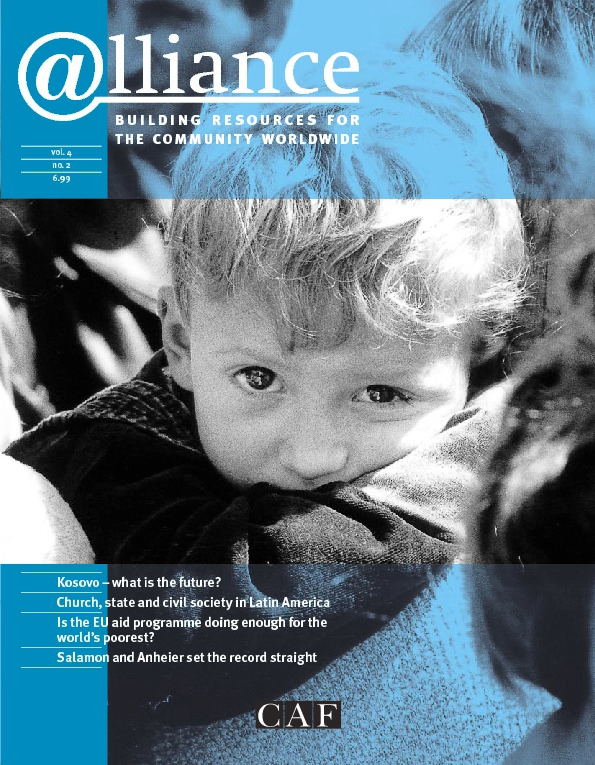What is the value of international exchange and learning in building the capacity of philanthropic support organizations? The case of the Centro Mexicano para la Filantropía (Mexican Center for Philanthropy – CEMEFI) suggests part of an answer. During the past 12 years CEMEFI has taken on a very wide range of functions and responsibilities in its efforts to encourage greater giving by corporations and individuals and to enhance the capacity of Mexican non-profits, including foundations.
It seems likely that this broad-based approach is at least partly due to the fact that both board and staff regularly participate in international networks and meetings, and that this has made them aware of the range of services such a centre can provide.
CEMEFI has a strong record of active participation in numerous regional and global networks, including WINGS, CIVICUS and the Encuentros Iberoamericanos de Filantropía. An indication of this commitment was the fact that CEMEFI hosted the first IMAG (International Meeting of Associations of Grantmakers) in 1998.
Founded in 1988, CEMEFI owes its existence to the vision of a wealthy local philanthropist, Manuel Arango, Founder and Honorary President of CEMEFI. He was himself inspired by the work of such institutions as the Council on Foundations and the Independent Sector in the USA, the Canadian Center for Philanthropy and the European Foundation Centre.
Over the past 12 years CEMEFI has moved beyond the vision of a single individual to become an effective support organization for the whole Mexican non-profit sector. It is funded from a variety of sources and offers an expanding array of services to an increasing number of individuals and organizations. It has also proved to be an excellent mechanism for convening the philanthropic sector and creating a space for dialogue with the Mexican Government on a non-partisan basis. In responding to the challenge of promoting philanthropy in Mexico, the Center has drawn extensively on relevant international experience.
Promoting philanthropy
Inspired by the Imagine programme in Canada, CEMEFI launched a public information campaign in 1994 to encourage companies and individuals to give 1 per cent of their income to helping others. The campaign was called Mira por los demas (Looking out for others) and was funded entirely by corporate contributions. It also sought to motivate individuals to contribute at least one hour of voluntary service per week. During the year 2000 the Mira por los demas campaign ran a programme entitled ‘One hour for Mexico’, which invited each citizen to commit to providing volunteer service for one hour a week. By the end of the year 60,000 individuals had joined the programme. The campaign has benefited from the donation of time on radio and TV stations, space in newspapers, and the time of prominent local philanthropists.
Promoting corporate social responsibility (CSR) has long been a main focus of CEMEFI’S work, and one that has benefited from the active involvement of board members. In collaboration with the Synergos Institute and Mexican non-profits such as Promocion de Desarrollo Popular (Promotion of People’s Development), the Center has hosted seminars and workshops on corporate social investment, drawing on experience from Mexico, the USA and Canada. It also provides ongoing support to a group of about a dozen corporations in the design and implementation of their philanthropy programmes.
A new programme aims to encourage CSR by awarding a ‘seal of social responsibility’ to companies meeting certain standards relating to working conditions, environmental impact, community relations and corporate ethics. The first batch of 14 companies will receive their awards in early 2001. The Center has also asked companies to submit examples of successful social responsibility practices, which are published in one of the main national business magazines.
Strengthening the capacity of the non-profit sector
CEMEFI offers a range of services to NGOs, both Center members and non-members,[1] often in partnership with academic institutions and other support organizations. These include running courses on topics such as ‘Volunteer Social Work’ and ‘Leadership Promotion for Social Development’, and helping create new support organizations such as the Mexican Volunteers’ Association.
CEMEFI also disseminates regular information on the sector through its quarterly magazine Filantropia and through the Center’s website. Every week a newsletter, Correo Cemefi. containing the latest information on activities in the philanthropy sector, both global and national, is posted on the website. Members also receive a newsletter, CEMEFI Informa, every two weeks to keep them up to date with CEMEFI’s own activities.
CEMEFI’s occasional publications includes reports on workshops on diverse subjects ranging from corporate responsibility to the work of street-based educators; a series of handbooks on topics such as board development and legal issues concerning the non-profit sector in Mexico; and a Directory of Philanthropic Institutions and a Directory of Environmental Organizations.
Research is another aspect of sector strengthening. In partnership with the Johns Hopkins Comparative Nonprofit Sector Project, CEMEFI has completed a study of the non-profit sector in Mexico.[2] In association with the Synergos Institute and Alejandro Natal of the Colegio Mexiquense, a study is currently being undertaken to survey and profile all grantmaking foundations in Mexico. The results will be used to develop a typology of grantmaking foundations and determine the types of services required.
Strengthen the enabling environment
In partnership with civil society ‘umbrella’ organizations such as Convergencia, national foundations such as the Miguel Alemán Foundation and academic institutions, CEMEFI has played a role in trying to create a more favourable legal and fiscal environment for non-profits, including grantmaking foundations. For example, it worked with the Canadian Center for Philanthropy and the US Council on Foundations to ensure that reciprocal arrangements could be developed regarding tax deductibility for philanthropic contributions within the framework of the North American Free Trade Agreement (NAFTA). To date, however, appropriate enabling legislation that permits the free flow of philanthropic resources between the three countries has not been approved in Mexico, despite the efforts of CEMEFI and its partners. CEMEFI is now vigorously pursuing this issue with the new administration of President Vicente Fox.
Support for foundations
CEMEFI also acts as an association of foundations, providing services to three affinity groups of foundations, community foundations, corporate foundations and other grantmaking foundations.
The past few years has witnessed the emergence of over 12 community foundations in Mexico. Some were created by the business community, some by civil society leaders and others with the support of state governments. CEMEFI, with the support of Synergos and the VAMOS and DEMOS Foundations, has been supporting the growth and institutional development of this group of community foundations. This support has included the organization of five national workshops to share experiences on topics such as fundraising and board development, with additional technical assistance being provided by foundation specialists from Brazil and the Dominican Republic (Lygia Fontanella and Nelson Colón are both Synergos Senior Fellows). These workshops, complemented by technical support to specific foundations, have produced significant results including an increase in funds raised, as a result of the development of fundraising plans and the introduction of new fundraising techniques. The latter include the incorporation of donor-designated funds and the marketing of foundations in partnership with the local hotel industry.
The experience over the past three years in nurturing the emerging community foundation sector illustrates the important role a national philanthropy centre such as CEMEFI can play in helping to build a network of relationships and linking to international support organizations.
The Center also convenes regular meetings of an affinity group of about 18 corporate foundations to exchange experiences on issues such as employee volunteer programmes, board development and social investment strategies and to build inter-sectoral alliances.
A third affinity group comprises about 20 other grantmaking foundations, which meet regularly for peer learning activities.
Conclusion
I suggest that CEMEFI has come to occupy such a central role in supporting the development of the non-profit sector in Mexico for a number of reasons. The first, already discussed, is the high level of participation by CEMEFI board and staff in international networks and events. Second, CEMEFI was fortunate enough to have the strong financial and intellectual backing of a highly respected local philanthropist, Manuel Arango (whose resources were subsequently matched by grants from US foundations[3]), to enable it to respond to the needs of the sector. Third, the Founder President and the three succeeding executive directors (Rodolfo Oggario, Ricardo Govela and Jorge Villalobos) shared an ambitious vision for CEMEFI and had the energy to develop it – a vision that was shared by the Board.
Interestingly, the Board has decided that the total annual budget of the Center should not exceed $800,000 nor the staff 20.
Synergos is a non-profit organization providing support to grantmaking foundations, associations of foundations and philanthropy support organizations globally through its foundation-building programme. Synergos has two other global programmes: the Global Philanthropists Circle and the Bridging Leadership programme. For more information about Synergos, visit the website at http://www.synergos.org
For more information about CEMEFI, visit the website at http://www.cemefi.org
1 CEMEFI has two types of membership, associate and affiliate. The 116 associate members (55 grantmaking and operating foundations, 28 corporations and 33 individuals) pay membership dues ranging from $500 to $25,000. 400 NGOs, mostly grant-seekers, are affiliate members, receiving services in return for an annual fee of $100. The General Assembly of Associates elects the Board of Directors, which in turn appoints the Executive Committee and the Executive President.
2 Chapter 22 in Verduzco, Gustavo, List, Regina and Salamon, Lester M (eds) (1999) Global Civil Society: Dimensions of the nonprofit sector Johns Hopkins Center for Civil Society Studies, Baltimore, USA.
3 While CEMEFI is becoming increasingly self-financing through membership fees and endowment income, it continues to receive 40 per cent of its income from the Ford, MacArthur, Kellogg, Mott, Inter-American and Packard Foundations.






Comments (0)